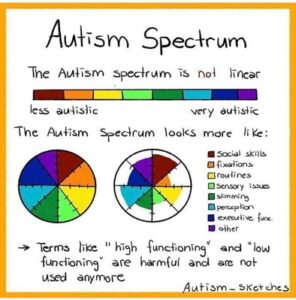Affecting approximately 1 in 54 children in the US today, autism is a developmental disorder that impacts behavior and social communication in different ways.
Since there is such a wide variety of autistic disorder types and severity of symptoms that people experience, autism is considered a “spectrum disorder.” While someone with Autism Spectrum Disorder (ASD) may not physically look different from others, they may interact, communicate, learn, and behave in ways that deviate from the norm.
The image below offers a visual representation of what the autism spectrum might look like. Contrary to what some may assume, the autism spectrum is not linear. Instead, it can be better understood as a pie, with each slice representing a different set of symptoms.

Examples of symptoms of someone with autism might include:
- Difficulty with social interactions and communication skills
- Repetitive behaviors
- Limited interests
- Avoiding eye contact with others
- Having sensory sensitivities
Sometimes symptoms are subtle, and other times, they can greatly impact the daily functioning of an individual with ASD. It is important to remember that people on the autism spectrum also have many strengths, such as being detail-oriented, being adept at absorbing knowledge, and excelling in math, science, music, or art. Language matters, and by understanding the unique experiences and strengths of people with autism, we can create more inclusive and thriving communities.
Diversus Health is a mental and behavioral healthcare organization that has been serving the Pikes Peak and tri-county area for over 145 years. If you or someone you love is struggling with mental health, call 719-572-6100 to begin the Same Day Access intake with one of our professional mental health providers at Diversus Health today. If you need immediate assistance, call our crisis hotline at 844-493-8255, text ‘TALK’ to 38255, or visit our 24/7 walk-in crisis center at 115 S. Parkside Dr.